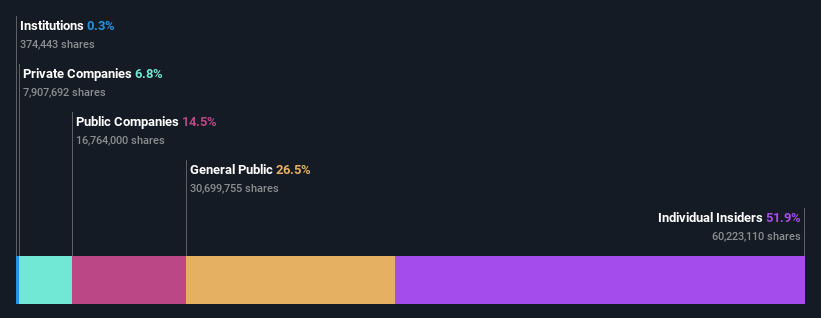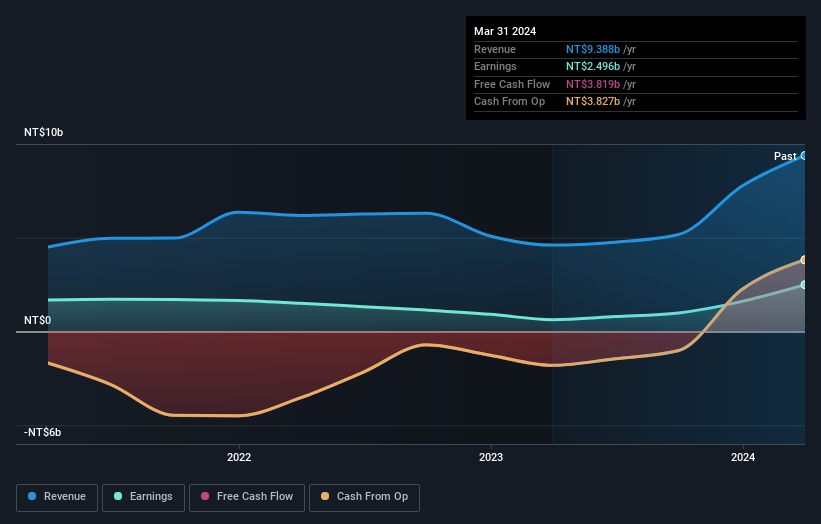- Taiwan
- /
- Real Estate
- /
- TWSE:2348
Insiders are the top stockholders in Hi-Yes International Co., Ltd. (TWSE:2348), and the recent 6.2% drop might have disappointed them

Key Insights
- Significant insider control over Hi-Yes International implies vested interests in company growth
- A total of 4 investors have a majority stake in the company with 54% ownership
- Past performance of a company along with ownership data serve to give a strong idea about prospects for a business
Every investor in Hi-Yes International Co., Ltd. (TWSE:2348) should be aware of the most powerful shareholder groups. And the group that holds the biggest piece of the pie are individual insiders with 52% ownership. In other words, the group stands to gain the most (or lose the most) from their investment into the company.
And last week, insiders endured the biggest losses as the stock fell by 6.2%.
In the chart below, we zoom in on the different ownership groups of Hi-Yes International.
See our latest analysis for Hi-Yes International

What Does The Lack Of Institutional Ownership Tell Us About Hi-Yes International?
Small companies that are not very actively traded often lack institutional investors, but it's less common to see large companies without them.
There are multiple explanations for why institutions don't own a stock. The most common is that the company is too small relative to funds under management, so the institution does not bother to look closely at the company. On the other hand, it's always possible that professional investors are avoiding a company because they don't think it's the best place for their money. Hi-Yes International's earnings and revenue track record (below) may not be compelling to institutional investors -- or they simply might not have looked at the business closely.

Hi-Yes International is not owned by hedge funds. Looking at our data, we can see that the largest shareholder is Xi-Wen Huang with 17% of shares outstanding. Meanwhile, the second and third largest shareholders, hold 14% and 11%, of the shares outstanding, respectively.
On looking further, we found that 54% of the shares are owned by the top 4 shareholders. In other words, these shareholders have a meaningful say in the decisions of the company.
While it makes sense to study institutional ownership data for a company, it also makes sense to study analyst sentiments to know which way the wind is blowing. As far as we can tell there isn't analyst coverage of the company, so it is probably flying under the radar.
Insider Ownership Of Hi-Yes International
The definition of an insider can differ slightly between different countries, but members of the board of directors always count. Company management run the business, but the CEO will answer to the board, even if he or she is a member of it.
Insider ownership is positive when it signals leadership are thinking like the true owners of the company. However, high insider ownership can also give immense power to a small group within the company. This can be negative in some circumstances.
It seems that insiders own more than half the Hi-Yes International Co., Ltd. stock. This gives them a lot of power. Given it has a market cap of NT$27b, that means they have NT$14b worth of shares. Most would be pleased to see the board is investing alongside them. You may wish todiscover (for free) if they have been buying or selling.
General Public Ownership
With a 26% ownership, the general public, mostly comprising of individual investors, have some degree of sway over Hi-Yes International. While this group can't necessarily call the shots, it can certainly have a real influence on how the company is run.
Private Company Ownership
It seems that Private Companies own 6.8%, of the Hi-Yes International stock. Private companies may be related parties. Sometimes insiders have an interest in a public company through a holding in a private company, rather than in their own capacity as an individual. While it's hard to draw any broad stroke conclusions, it is worth noting as an area for further research.
Public Company Ownership
We can see that public companies hold 14% of the Hi-Yes International shares on issue. It's hard to say for sure but this suggests they have entwined business interests. This might be a strategic stake, so it's worth watching this space for changes in ownership.
Next Steps:
It's always worth thinking about the different groups who own shares in a company. But to understand Hi-Yes International better, we need to consider many other factors. To that end, you should learn about the 4 warning signs we've spotted with Hi-Yes International (including 1 which is significant) .
Of course this may not be the best stock to buy. So take a peek at this free free list of interesting companies.
NB: Figures in this article are calculated using data from the last twelve months, which refer to the 12-month period ending on the last date of the month the financial statement is dated. This may not be consistent with full year annual report figures.
Valuation is complex, but we're here to simplify it.
Discover if Hi-Yes International might be undervalued or overvalued with our detailed analysis, featuring fair value estimates, potential risks, dividends, insider trades, and its financial condition.
Access Free AnalysisHave feedback on this article? Concerned about the content? Get in touch with us directly. Alternatively, email editorial-team (at) simplywallst.com.
This article by Simply Wall St is general in nature. We provide commentary based on historical data and analyst forecasts only using an unbiased methodology and our articles are not intended to be financial advice. It does not constitute a recommendation to buy or sell any stock, and does not take account of your objectives, or your financial situation. We aim to bring you long-term focused analysis driven by fundamental data. Note that our analysis may not factor in the latest price-sensitive company announcements or qualitative material. Simply Wall St has no position in any stocks mentioned.
About TWSE:2348
Hi-Yes International
Engages in the real estate agency and brokerage businesses in Taiwan.
Good value with proven track record.


